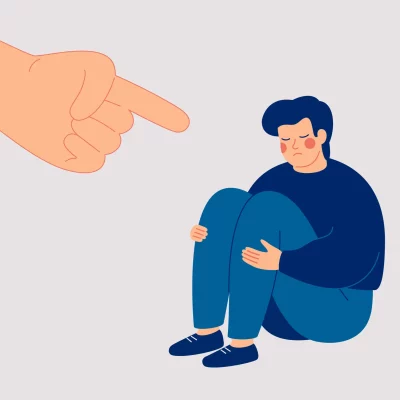Do you ever feel like you can’t escape from the intense emotions that come with rejection?
Do you isolate yourself from social occasions to prevent the chance of feeling rejected?
If you relate to either of these questions, you may be experiencing Rejection Sensitive Dysphoria (RSD).
RSD is a condition that causes intense emotional pain in response to actual or perceived rejection, criticism, or failure. It’s most commonly found among those with Attention Deficit Hyperactivity Disorder (ADHD) but can affect anyone. People with RSD often experience symptoms such as depression, anxiety, and low self-esteem, which can significantly affect a person’s quality of life.
In this post, we will dive into the symptoms, triggers, and how to cope with RSD, with a couple of extra takeaways to help better understand this disorder and master emotional regulation.
The ADHD and Emotional Dysregulation Link
Emotional dysregulation, the root cause behind RSD, is the inability to regulate one’s emotions, resulting in intensifying reactions and difficulty controlling moods.
People with emotional dysregulation may experience an exaggerated response to adverse events or feelings of distress disproportionate to the situation. These feelings can lead to problems such as impulsivity, aggression, anger outbursts, and difficulty managing day-to-day stressors.
Emotional dysregulation is common among those with Attention Deficit Hyperactivity Disorder (ADHD). In fact, almost 100% of people with ADHD experience RSD due to how big of a part emotional dysregulation plays in ADHD.
Often, this emotional dysregulation condition is called RSD ADHD due to that high frequency of coexistence between the two disorders. However, because individuals can experience RSD without having ADHD, we have refrained from calling it RSD ADHD in this post. Still, this significant link is critical to note.
Symptoms of Rejection Sensitive Dysphoria
Although everyone experiences RSD a little differently, there are some common symptoms that can be present. These shared symptoms include:
- Low self-esteem
- Withdrawing from social activities
- Difficulty interacting with peers and maintaining a relationship
- Difficulty handling criticism or rejection
- Feeling overly sensitive to even minor criticism or failure
- Feeling a sense of despair or sadness
The intensity of these symptoms can vary from person to person. Generally, most who experience this type of emotional dysregulation will experience several, if not all, symptoms from the list above.
RSD Triggers
Triggers vary in intensity and come in many forms. It can be as minor as forgetting to text a friend back or not getting the job you applied for. Triggers of RSD may also be related to events that occurred in childhood, such as being teased or feeling socially rejected by peers.
Common RSD Triggers include:
- Feeling ignored or left out
- Receiving negative feedback or criticism
- Making mistakes in school/work/social situations
- Losing a job, friendship, or romantic relationship
- Fearing failure in essential tasks such as tests and presentations
- Feeling judged by others for their decisions and choices
Triggers can be both physical and emotional. Take time to recognize what tends to increase the severity or frequency of your symptoms to understand better how to prevent and cope with those thoughts as they arise.
The 6 Tips for Mastering Emotional Regulation
Although RSD can be complex, some strategies can help make it more manageable. After identifying the things that trigger your emotional response and learning how to recognize when you’re feeling overwhelmed, the next step is to learn coping skills to manage your feelings as they come.
Here are tips for managing RSD and mastering emotional regulation:
- Focus on thoughts that are positive and self-affirming.
- Setting realistic goals; avoid committing to too many goals at once.
- Find and participate in activities that make you feel good about yourself.
- Talk to someone or write down your thoughts and feelings to process them before you internalize them.
- Practice mindfulness and breathing exercises to help you stay in the present moment.
- Prioritize self-care and create a healthy daily routine.
By practicing these strategies, it is possible to manage your symptoms and learn to reduce the sensitivity to real or perceived rejection.
These strategies may be beneficial when used on your own. Still, if RSD dramatically impacts your life, you may need to find a counselor who can more intensely help you manage your thoughts and lifestyle to reduce the severity and occurrence of your thoughts and feelings of rejection.
Find an ADHD Specialist Near You
If you think you may be experiencing RSD, finding a counselor specializing in ADHD can be helpful. They can provide support and guidance for managing your condition and help you identify strategies that can help manage the intense emotions of RSD.
RSD can be tough to conquer on your own, but often the feelings of guilt prevent those suffering from getting the help they need. There is no shame in taking action to learn ways to cope with something bothering you. Being proactive is an incredible trait that will ultimately lead you to find relief and empowerment.
Conclusion
Rejection Sensitive Dysphoria (RSD) is a condition commonly found among those with Attention Deficit Hyperactivity Disorder (ADHD). It can cause intense emotions in response to criticism or failure, leading to depression, anxiety, and low self-esteem.
People with ADHD are more likely to experience this type of emotional dysregulation due to difficulty regulating emotions. Finding a mental health specialist specializing in ADHD can help manage symptoms of RSD.
With the proper support, it is possible to find strategies to help one cope with the intense emotions of RSD. It’s also essential to build a strong support network of friends and family members who understand what you’re going through and can provide emotional support.
If you want to start your therapy journey today, visit our counselors’ page to find a therapist specializing in ADHD. From there, you can call us or get started here to make an appointment. Together, we can help you find relief from the thoughts holding you back from living your best life.
Have you found ways to master your emotions when dealing with RSD or ADHD? Let us know below!







